 Leading Blog | Posts by Category |
 Leading Blog | Posts by Category |
01.18.25

Learn to Take Time to Take Time to Change
HOW do you start your day? Is it hitting snooze 4 times before you reluctantly crawl out of bed, accepting your fate of another day? Or, are you on the other side of the spectrum, waking up at 4 am in order to ‘win the day,’ hitting the gym and grabbing a quick post workout bite before most people are even awake? Maybe you are a night owl work late and take your coffee black at 2 pm. Whatever your daily routine, it may be time to look at it with a fresh pair of eyes and an intention to change something. Most people make the mistake of going big where change is concerned. The quintessential example of this is the night owl, with trouble waking up before 8 am, setting a goal to wake up early, maybe at 6:30 am every day, hoping it will help them become the person they always wanted to be. Assuming they’re like most, they might succeed in this endeavor for a few days, maybe even a week or two, but as is the way with most resolutions, they will eventually revert back to old habits. Soon, one day will turn into two, and before they know it, months have gone by and they are making the same promise all over again. Unfortunately, continually repeating the same failing scenario produces a negative feedback loop that permits people to talk disparagingly to themselves, e.g. you suck; you really should get out of bed on time and quit being a bum. The negative feedback becomes a detriment to self-image, and as studies show, a negative self-image can affect everything from how much you earn, to the quality of friends you keep, to what you eat, and to what you allow into your body. In short, your negative self-talk creates a negative self-image, which potentially creates harmful self-sabotage. Change is Coming Whether it’s to start the year on a positive footing, or choose to make changes when the time is right, here are 3 tips on how to move forward based on who you already are and who you hope to become. Tip #1: Start small Rather than being the night owl who suddenly aims to wake up at 6 am, essentially trying for a 180 degree turn in lifestyle and schedule, aim lower. Your resolution could be to go to bed 1 hour earlier, stop watching TV 2 hours before bed, or maybe sleep-in late one day a week. So often we pick solutions based on the equivalent of “cheat codes” in video games. Rather than putting in the time to become a person who constantly gets a great night of sleep, we foolishly plug in a habit (code) that some guru swears will make us successful. Instead, let your changes be small, incremental improvements based on where you are now. Waking up at 6 am can still be your long term goal, but by setting an initial target to go to bed an hour earlier in month 1, then once you have this down adding 10 minutes of stretching in month 2, and so on, you’ll not only find it easier to eventually wake up at 6 am, you’ll find that by making small incremental adjustments along the way, you secretly architected a new lifestyle, making the big goal much easier to achieve. Tip 2: View your habits as investments in yourself, not as a checklist you will be graded on One year, I made a resolution to quit drinking. Still in my late 20s, and coming out of a recent divorce, I’m sure I don’t have to tell you it didn’t last long. Eventually, I got there (3 years later), but it wasn’t easy. Part of the trouble was allowing one lapse in behavior to fuel another. When a buddy would ask, “you want a beer?” it was so much easier to say yes when I already had a drink the night before, my excuse usually being, “sure, I drank yesterday, it’s not like I can go back and undo that.” Part of my underlying logic was based on keeping score. Losing yesterday meant I had already blown getting a perfect record, so there was no real harm doing it again. It wasn’t until I read the 5 am Club, by Robin Sharma, and started viewing my habits as investments in myself and my life, that I really started to make progress. Saying no to a beer wasn’t about some arbitrary checklist on which I was keeping score for and with myself. Rather, it was a decision to invest in myself; saying “no” meant I’d have more energy the next morning to do the things I cared most for. Tip 3: When in doubt, start your day doing the thing you love for at least 30 minutes I love to read and I love to learn new things. Therefore, I start every day by brewing my favorite mushroom coffee, sitting down with a book on the subject I currently want to learn more about, and then losing myself in both the coffee and the book for at least 30 minutes. Sometimes, I read about business and investing. Other times, I learn about color in art and the history of pigments. Recently, I’ve been mixing in books on flying, since I’m currently working on getting my pilots’ license. By starting my day with my favorite things, this daily habit helps me get out of bed and also stay focused on what I want, instead of getting sucked into social media or other form of distraction. Maybe you love yoga or weight lifting. Or maybe you don’t yet know what you love. If that’s the case, start by taking 30 minutes a day to explore things you might be interested in. Eventually, you’ll find something that brings you joy, improves your opinion of yourself, and helps you get out of bed, eager to learn more about it.
Sean McMann was recruited right out of college to work at one of the largest data firms, and then embarked on an eight-year journey from new grad to consulting director. Privileged to see behind the curtain of some of the largest corporations today, he recognized the system was broken and quit at the height of his career, when working the least but making the most money he ever had, betting everything, including his money, reputation, and time, on trying to fix the problem of the corporate jungle. He shares his insights in his new book, Hacking the Corporate Jungle: How to Work Less, Make More and Actually Like Your Life. When he's not writing, researching, and speaking, McMann spends his time riding his bike, visiting art museums, snowboarding, and playing with his two young sons. Learn more at seanmcmann.com.
Posted by Michael McKinney at 05:42 PM
06.22.24

Tom Brady: To Be Successful at Anything, You Don’t Have to Be Special 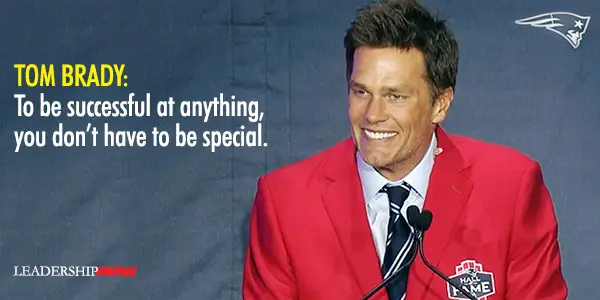
Last Wednesday, June 12, in front of almost 60,000 people, the greatest quarterback of all time, Tom Brady, was inducted into the New England Patriots Hall of Fame. In an outstanding, emotional 20-minute acceptance speech, he reflected on football and life. Here are some of his key thoughts that apply to us all. It’s hard to throw, catch, block and tackle and hit kids when they’re way bigger and way more developed than you, only to go home that night bruised and battered and strained, but knowing that you have to show up again the next day for just the chance to try again. But understand this: life is hard.
Posted by Michael McKinney at 09:47 PM
11.11.23

Most Americans Own Books — But Not Many
 YouGov asked more than 29,000 Americans whether they owned books and found that the vast majority did: 85% said they owned at least one physical book. They report the following findings: However, one in five Americans say they own between one and ten physical books. Including the 9% of respondents who say they own no physical books, at least 69% of Americans own no more than 100 books. Another 25% own at least 100 books, including 4% who own between 500 and 1,000 books and 3% who own more than 1,000 volumes. Looking at age, 19% of Americans between 31 and 35 years old own at least 100 physical books, compared to 31% of those between 51 and 55 and 42% of those between 71 and 75. The higher the education level, the more books they own. For example, among 31- to 35-year-olds, 8% of people whose highest level of education is a high school diploma own at least 100 books, compared to 25% of people in the same age range with postgraduate degrees. When it comes to how they arrange their books, 29% of book-owning Americans say they don’t organize their books. 22% of book-owning Americans organize their books by genre or subject. Sorting books by color is more popular among younger Americans. Among book owners under 30, 6% say they sort by color, compared to less than 1% of book owners who are 65 or older.
Posted by Michael McKinney at 06:24 AM
01.28.23

The Top Toys from the Year You Were Born
Jacob Osborn and Peter Richman put together a list of the top holiday toys in the U.S. through the years over on Stacker. Toy shopping has transformed over the past 100 years due to advancements in the products or the marketplace. Stacker searched for products from 1920 to today that caught hold of the public zeitgeist through novelty, innovation, kitsch, quirk, or simply great timing, and then rocketed to success. The list was curated using national toy archives and data curated by The Strong National Museum of Play. Some items remain curious relics of the past, while others are essentially as iconic now as they were upon their debut. Each one also functions as a window into American culture.”
Posted by Michael McKinney at 06:30 PM
10.07.22

John Foster Dulles Fires George Keenan
The legendary James “Scotty” Reston—a two-time Pulitzer Prize winner and executive editor of The New York Times—recounts a story in his autobiography Deadline about the secretary of state John Foster Dulles’ handling of George Keenan. Dulles had a “remarkable talent for getting rid of many of the most qualified men in the State Department when he thought they disagreed with him or embarrassed him politically.” Keenan was part of a group of foreign policy elders Walter Isaacson and Evan Thomas, later referred to as “The Wise Men.” When Dulles became secretary of state in the Eisenhower administration, he saw no need to share responsibilities and promptly got rid of George Keenan, who Reston reports was the most knowledgeable Soviet expert in the country. Reston shares how that incident went down:
Posted by Michael McKinney at 05:14 PM
02.26.22

What Would They Look Like If They Lived Today?
Hidreley Dião created a series transforming historical figures into contemporary-looking people. He asked, “What if they lived in these days?” He says the most time-consuming part is finding an image that resembles the historical figure. He says, “I spend hours in image banks until I get it.” He uses Artbreeder, Photoshop, and FaceApp. Each image takes about 2 hours to create. You can find his work on Instagram
Posted by Michael McKinney at 05:51 PM
02.12.22

All You Need to Know About Bitcoin 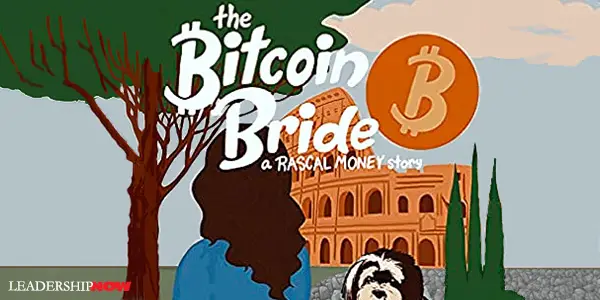
IF YOU have ever wondered what Bitcoin and blockchains are all about, look no further that Chris Brady’s The Bitcoin Bride. (Chris Brady is the coauthor of the New York Times bestseller, Launching a Leadership Revolution: Mastering the Fives Levels of Influence.) The Bitcoin Bride tells the story of two young lovers, Marcus and Cassandra. He wants to surprise her with a marriage proposal, but first, he wants to seek the blessing of her father, Giulio, in Italy. So off they go to her home town, Grottaferrata, Italy. When he brings up the topic, Giulio informs him that although he ticks all of the boxes, he will give him his blessing “if and only if, in the remaining two weeks you are here, you convince me, and explain Bitcoin and how it works and that it is a good idea.” Marcus had put his education on hold to join a startup Bitcoin mining operation. So enlisting his knowledgeable friends, he begins to explain to Giulio the what, why, and how of Bitcoin. And Giulio has many questions. First, Marcus lays out the foundational issue that Bitcoin is designed to fix: The first step in all of this is to realize money is broken. It is centralized in the hands of governments and banks who serve themselves at the expense of the people. What makes all of this possible is the fact that fiat money is disconnected from anything of value, and its supply is strictly under the control of governments who want and need to spend it, and banks who want and need to lend it. He then explains how it was created and how it works, the mining of Bitcoin, security, and investing. I have to share one remarkable story that Brady tells about the early days of Bitcoin. Bitcoin was released in January of 2009, but soon it had developers deliberating about its actual value. Well, it wasn’t long before they began wondering what they could buy in the real world. On May 22, 2010, a day that will forever after be referred to as “Pizza Day” in Bitcoin folklore, a Bitcoin enthusiast in the United States named Laszlo Hanyecz decided to try an experiment. He went on a Bitcoin talk forum and said that he would pay 10,000 bitcoins to anyone who would deliver to him two large pizzas. He said he didn’t care if the person made t himself or ordered it from a local pizza joint. Interestingly, a man in England took him up on his offer and made a phone call to the Papa John’s pizza shop located near Hanyecz. Two large pizzas were delivered, and Hanyecz then transferred 10,000 bitcoins across the Bitcoin network to the sender of the pizzas. Those bitcoins are worth hundreds of millions of dollars today. The Bitcoin Bride is a fun and very informative book. All of the pros and cons you’ve ever heard are covered in this book, including much of the misinformation regarding speculation, bubbles, and the dark web. As a bunch of rascals started Bitcoin, it makes me think I should read Chris Brady’s other book, Rascal: Making a Difference by Becoming an Original Character, next!

Posted by Michael McKinney at 05:46 PM
04.12.20

Self-Made: The Story of Madam C.J. Walker
NETFLIX brings to life the entrepreneurial success story of African American entrepreneur and philanthropist Madam C.J. Walker. The four-hour mini-series Self-Made starring Oscar-winner Octavia Spencer is based on Walker's great-great-great-granddaughter A’Lelia Bundles book, On Her Own Ground: The Life and Times of Madam C.J. Walker. Madam C.J. Walker was born Sarah Breedlove on December 23, 1867, on a plantation in Delta, Louisiana, to former slaves-turned sharecroppers after the Civil War. Her rags-to-riches story is inspiring and a testimony to hard work, persistence, and resourcefulness. Seeking a way out of her poverty, she became a washerwoman and cook. Eventually moving to Denver, Colorado, she married ad-man Charles Joseph Walker and renamed herself “Madam C.J. Walker.” With $1.25, she created a line of hair products and straighteners for African American women and became one of America’s first self-made female millionaires. As her business grew, she applied her success to philanthropy giving to organizations focused on the social well-being of Black Americans. She also gave six scholarships to the Tuskegee Institute. Walker died of kidney failure and complications due to hypertension on May 25, 1919. Her estate was valued at about ten million dollars. While Self-Made successfully brings awareness to Walker’s life and accomplishments, it is a dramatized story—facts are compromised, but the essence is there. It is a good look into the entrepreneurial mindset. If you want to know more about her life, you might start with Oprah Magazine’s What Self Made Got Right—and Wrong—About Madam C.J. Walker. Madam C.J. Walker on the business of life:
Posted by Michael McKinney at 12:25 PM
04.04.20

Need More Drama?
IN CASE the media isn't providing enough clickbait and drama in your life, we resurrect this advertising gem from 2012. The backstory: For the launch of the high-quality TV channel TNT in Belgium, a button was placed on an average Flemish square of an average Flemish town near a sign with the text "Push to add drama" that invited people to use the button. Then they waited...
Posted by Michael McKinney at 07:19 PM
02.17.19

Thomas Jefferson's Ten Rules to Live By
THOMAS JEFFERSON was skilled in many fields. In December 1962, John F. Kennedy entertained a group of Nobel prize winners in the White House and welcomed them as the most distinguished gathering of intellects to dine in the Executive Mansion “with the possible exception of when Mr. Jefferson dined here alone.” Jefferson cared for people and always offered advice when asked. A year before his death, he was asked by a father to give some counsel to his young son, Thomas Jefferson Smith. He responded with a letter that began: Monticello Feb. 21. 1825. The letter concluded with ten rules to live by Jefferson titled A Decalogue of Canons for observation in practical life:
The complete letter can be found on the National Archives website.
Posted by Michael McKinney at 04:40 PM
02.03.19

Super Bowl Edition: Julius Peppers Retires from the NFL 
Dignity and class. On and off the field, Julius Peppers was a leader. New England Patriots quarterback Tom Brady said, “Julius has had an incredible impact in the NFL from the day that he came in. What an amazing player over the course of a long period of time. Just incredible physical, mental toughness. What an incredible career.” New England Patriots tight end Rob Gronkowski recalls, “I remember my first time lining up versus him, and I looked up and I was like 'This dude's a freak! His arms are like five times bigger than mine! He's a great player, and it was just an honor to be able to compete versus him.” Los Angeles Rams defensive tackle Aaron Donald remembers, “He's one of the best to ever do it. Made a lot of plays. I remember as a kid watching him play. Just a whole lot of respect for him. I remember being at a Pro Bowl, got an opportunity to talk to him and try to, like, feed off of him, ask him questions. One heck of a football player.” His accomplishments on the field are impressive but off the field, he demonstrated leadership, community, and empathy. In February 2009, Peppers donated $500,000 to a scholarship program that supports black students at his alma mater the University of North Carolina at Chapel Hill. After Hurricane Florence, the North Carolina native started the Julius Peppers Hurricane Florence relief fund by donating $100,000 and encouraged his teammates and other NFL players to join in. Actively involved in the recovery efforts, he told the Charlotte Observer, “I think a big part of the solution to these problems, and a big part of the help is the volunteers. People actually getting out there on the ground, putting in the work, going around helping other people and showing compassion for your neighbors. That really left an impression on me. ...People need to know that we’re all a big community and we all need help from time to time.” Julius Peppers announced his retirement Friday, February 1 after seventeen years in the NFL. He left us this video: “Thank you.
And thank you, Julius, for showing us the mind of a leader.
Posted by Michael McKinney at 09:02 AM
01.17.15

When Life Gives You Lemons, Make Lemonade 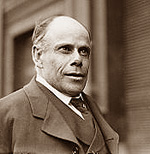 In 1883 he made a trip to London and performed before the then Prince of Wales who later went on to become King Edward VII. He quickly became a favorite of the English royal family. Wilder's career eventually branched into vaudeville and in 1904 embarked on a round the world tour. In a memorial to his life, The King of Jesters, Elbert Hubbard praised him for his optimism and achievements in the face of his disabilities. He wrote: He was a walking refutation of that dogmatic statement, Mens sana in corpore sano. His was a sound mind in an unsound body. He proved the eternal paradox of things. He cashed in on his disabilities. He picked up the lemons that Fate had sent him and started a lemonade-stand.Hubbard coined the concept "when life gives you lemons, make lemonade." It was later popularized by the likes of Dale Carnegie who used it in his book How to Stop Worrying and Start Living. Carnegie's wrote: If You Have a Lemon, Make a Lemonade.
Posted by Michael McKinney at 08:28 AM
06.20.14

What it Takes to be Excellent The Bleacher Report created this well done video: Cristiano Ronaldo—Greatness Awaits. It’s an inspiring look at what it takes to be excellent—at anything. The video concludes with: And legends aren’t born from mediocrity. They are born from excellence. They are born from being the best. From being the hardest working. Legends are born from failure. They are born from falling down time and time again and having the grit to get back up again. Legends are born from adversity. They are forged in the crucible of struggle. Heroes come and go. But legends, legends live forever.
Posted by Michael McKinney at 09:30 PM
06.08.13

Try to See Things My Way This short film (1:41) is from actor and storyteller, Jason Headley. It's titled It's Not About The Nail with Monica Barbaro. "Don't try to fix it. I just need you to listen." Every man has heard these words. And they are the law of the land. No matter what.
Posted by Michael McKinney at 09:13 AM
06.17.12

A Father's Advice: F. Scott Fitzgerald on What to Worry About  DEAR PIE: I feel very strongly about you doing duty. Would you give me a little more documentation about your reading in French? I am glad you are happy--but I never believe much in happiness. I never believe in misery either. Those are things you see on the stage or the screen or the printed page, they never really happen to you in life. All I believe in in life is the rewards for virtue (according to your talents) and the punishments for not fulfilling your duties, which are doubly costly. If there is such a volume in the camp library, will you ask Mrs. Tyson to let you look up a sonnet of Shakespeare's in which the line occurs Lilies that fester smell far worse than weeds.... Half-wit, I will conclude. Things to worry about: Worry about courage Worry about Cleanliness Worry about efficiency Worry about horsemanship Worry about… Things not to worry about: Don’t worry about popular opinion Don’t worry about dolls Don’t worry about the past Don’t worry about the future Don’t worry about growing up Don’t worry about anybody getting ahead of you Don’t worry about triumph Don’t worry about failure unless it comes through your own fault Don’t worry about mosquitoes Don’t worry about flies Don’t worry about insects in general Don’t worry about parents Don’t worry about boys Don’t worry about disappointments Don’t worry about pleasures Don’t worry about satisfactions Things to think about: What am I really aiming at? How good am I really in comparison to my contemporaries in regard to: (a) Scholarship (b) Do I really understand about people and am I able to get along with them? (c) Am I trying to make my body a useful instrument or am I neglecting it? With dearest love,
Posted by Michael McKinney at 01:22 PM
05.06.12

Get Real. Get Outside. In a print campaign directed at people immersed in the modern digital world for garden power tool company STIHL Australia, we are encouraged to discover the simple joys to be found outside. “Get Real. Get Outside.” It was developed by Whybin\TBWA\Tequila (Australia).  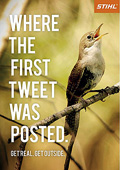  
Posted by Michael McKinney at 09:01 PM
03.17.12

Keep Calm and Carry On
Stuart and Mary Manley are proprietors of one of the most beautiful secondhand bookstores anywhere—Barter Books—in the northeast corner of Northumberland, England. After being forgotten for more than 70 years, they rediscovered, in a box of old books bought at auction, a rare original of the now famous WWII poster Keep Calm and Carry On. Produced more than 70 years ago, this poster was one of three propaganda posters produced by the British government in the spring of 1939 in the build up to World War II. To be used in a time of crisis or invasion, this poster was never officially issued to the public. All of the posters were printed in two colors, using a “special and handsome” typeface, which would be difficult for Germany to counterfeit, along with the crown of King George VI as the only graphic device. 
Posted by Michael McKinney at 09:46 PM
11.06.11

I, Steve: Steve Jobs in His Own Words George Beahm has compiled a collection of Steve Jobs quotes in I, Steve. Organized by topic, this is a great (and sourced) collection. Here are a few:
George Beahm has compiled a collection of Steve Jobs quotes in I, Steve. Organized by topic, this is a great (and sourced) collection. Here are a few:
• I would trade all my technology for an afternoon with Socrates.

Posted by Michael McKinney at 07:32 AM
01.30.11

Hay Group's 2010 Best Companies for Leadership Hay Group, a global management consulting firm, released its 2010 Best Companies for Leadership Study and Top 20 list. The study ranks the best companies for leadership around the globe and examines how those companies develop current and future leaders. 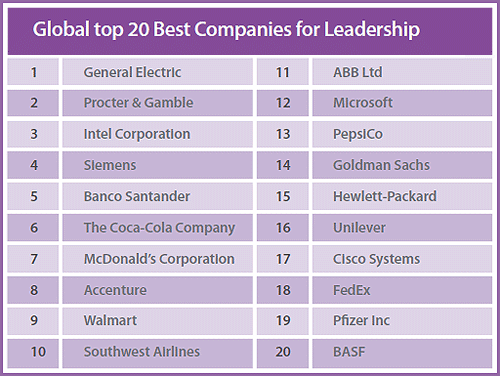 According to Hay Group’s study, all of the Top 20 companies report that everyone at every level of the organization has the opportunity to develop and practice the capabilities needed to lead others, compared to less than 70 percent of all other companies in the study. In addition, 90 percent of the Top 20 companies report that people are expected to lead regardless of whether they have a formal position of authority, compared to only 59 percent of other companies. “The Top 20 Best Companies for Leadership are at the forefront of a significant shift away from hierarchical organizational operating models,” said Rick Lash, Director in Hay Group's Leadership and Talent Practice and co-leader of the Best Companies for Leadership Study. “Leadership in the twenty-first century is about leading at all levels; not restricting it to title. As organizations become flatter, the best leaders are learning they must check their egos at the door and become increasingly sensitive to diversity, generational and geographical issues.” 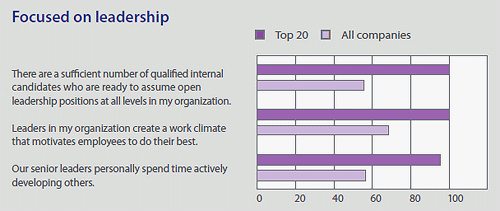 They found that the best companies are moving more quickly and completely than other companies to flatten their structures and prepare their managers to lead effectively within it. Specifically they drive collaboration and cross-functional leadership and innovation, actively seek greater cultural diversity in their leaders and workforces, and they show a strong focus on developing leaders within their organizations. In the process, they are gaining important competitive advantages. Related Interest:
Posted by Michael McKinney at 11:36 AM
11.12.10

30 Surprising Facts About George Washington IN Washington: A Life, Ron Chernow calls Washington “the most famously elusive figure in American history.” In 928 pages—the longest single-volume biography of Washington ever published—Chernow wants to render George Washington real and credible. And he succeeds. Chernow offers these facts about George Washington. 
Posted by Michael McKinney at 05:50 PM
04.17.10

Free E-books on Communication and Pricing This weekend you might want to read a couple of good e-books. And they're free! 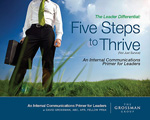 First, there is The Leader Differential: Five Steps to Thrive (Not Just Survive) by David Grossman, founder of The Grossman Group, a Chicago-based internal communications agency. This 21 page e-book is essentially an internal communications primer that offers corporate leaders basic (but effective) tips for communicating with employees in a way that will result in measurable outward company growth. Here are a couple of thoughts from this e-book: Reflect on what others are seeing and reading every time they interact with you, and develop the awareness not only to act the role of the leader you want to be, but to role model the actions and characteristics that you would like to see in others.And one of the biggest complaints employees have in these uncertain times is that they are not getting enough information or they get what turns out to be simply misinformation cloaked in openness. How much information is enough information? Grossman states: Naturally, it depends on the situation, but in the case, for example, that you’ve got a big elephant in the room—a reorganization, a high-level executive change, a merger or acquisition, a round of layoffs, or anything else that could be seen by employees as directly threatening their positions at your company—tell them what you know, what you don’t know, when you’re going to find out additional information, and stamp out myths or misperceptions. The key here is transparency, which means addressing the issue at hand before it spirals out of control.Grossman provides guidance in how much to communicate and then how to control the message. 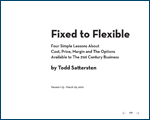 Next, check out Todd Sattersten’s Fixed to Flexible. This 37 page e-book is about cost, price, margin, and the options we have for how to sell. From the introduction: Fixed has been replaced with flexible. Control of a product category, distribution channel or branding message no longer exists. While this is being heralded as a boon for customers, companies have been slower to adapt to the new terrain. Companies with multi-national presence and individuals with multitudes of projects both need to create a new set of strategies.This ebook collects the commercial aspects of cost, price, and margin and presents a variety of alternatives about how to make your way in the world of infinite choice.
Posted by Michael McKinney at 08:01 AM
02.21.10

What Organizations Value in Leaders Bloomberg BusinessWeek.com and Hay Group have released the results of their annual survey which ranks the best companies for leadership and examines how those companies develop leaders. Last year the quality that the Top 20 companies valued most in their leaders was execution—the ability of leaders to achieve results through others. This year, the most valued quality is strategic thinking. "This year's emphasis on strategic thinking suggests that, like an individual recovering from a personal upheaval, businesses today are taking stock: reviewing their options, rethinking their strategies, considering new opportunities and innovations." It also suggests more long-term thinking. 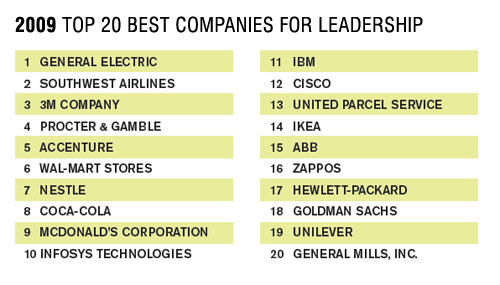
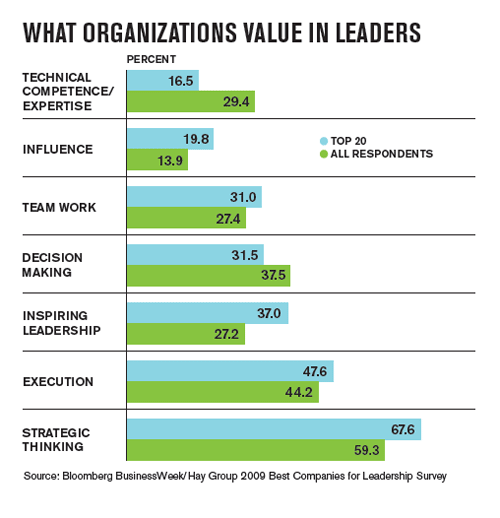 "While the data suggest there is no one best way to grow leaders, the companies that do it best share certain key characteristics. The top 20 companies address leadership development on multiple fronts, from articulating how leadership behavior needs to change to meet the challenges of the future to managing their pools of successors for mission-critical roles. And, despite the chaotic, crisis-strewn atmosphere of the past year, they've continued to make leadership a top priority."
Posted by Michael McKinney at 09:39 AM
01.03.10

George Washington's Rules of Civility and Decent Behavior If you're considering some personal development goals you couldn't go wrong reviewing the 110 Rules of Civility & Decent Behavior once copied down by George Washington.  Today many, if not all of these rules, sound a little fussy if not downright silly. It would be easy to dismiss them as outdated and appropriate to a time of powdered wigs and quills, but they reflect a focus that is increasingly difficult to find. The rules have in common a focus on other people rather than the narrow focus of our own self-interests that we find so prevalent today. Fussy or not, they represent more than just manners. They are the small sacrifices that we should all be willing to make for the good of all and the sake of living together. Check them out at Foundations Magazine.
Posted by Michael McKinney at 09:11 AM
11.15.09

Confirmation Bias In the Wall Street Journal, Jason Zweig writes about the specific application of a general issue: confirmation bias. It is a never-ending battle that affects all of us and is worth reading for the reminder. He offers specific ideas to counteract its pull that can be applied to whatever you are doing. Here are a few edited excerpts from Ignoring the Yes-Man in Your Head to introduce the issue: In short, your own mind acts like a compulsive yes-man who echoes whatever you want to believe. Psychologists call this mental gremlin the "confirmation bias." A recent analysis of psychological studies with nearly 8,000 participants concluded that people are twice as likely to seek information that confirms what they already believe as they are to consider evidence that would challenge those beliefs.
Posted by Michael McKinney at 11:57 AM
03.14.09

ReQuotes: "You're gonna like the way they sound. I guarantee it!" In an issue of Direct magazine, you will find legendary copywriter Herschell Gordon Lewis in his usual good form. In his Curmudgeon at Large column he ponders “how successful certain events would have been if the principals had been shrewd and savvy enough to pick up some of our advertising and marketing talk.” Here are several outtakes:
Posted by Michael McKinney at 11:04 AM
03.01.09

Protect Your Lunch with Anti-Theft Lunch Bags As more and more people brown bag it, this handy little item might be of interest. Tired of having your food stolen by sticky-fingered coworkers or roommates? Bullies taking your kid's lunch? Well, worry no more . . . Anti-Theft Lunch Bags are sandwich bags that have green splotches printed on both sides, making your freshly prepared lunch look spoiled. Don't suffer the injustice of having your sandwich stolen again! Protect your lunch with Anti-Theft Lunch Bags. These sandwich size (food-safe reusable and recyclable LDPE) bags may still be available from the designer the. (no that's it - "the.") the. is the official marketplace for amusing and eclectic wares designed by the. team. Mihoko Ouchi and Sherwood Forlee make up the. team. They have other interesting products they have designed on their web site. Have a look.
Posted by Michael McKinney at 08:28 AM
11.22.08

Lunch with the FT: Tom Peters In the weekend edition of the Financial Times there is a great interview with Tom Peters by Stefan Stern. It’s candid and worth a read. Here’s a sample: Few have criticized what he does for a living as ferociously as Peters himself. “I say to people, ‘You got a bad deal, paying money to see me,’” he tells me. “I have utterly nothing new to say. I am simply going to remind you of what you’ve known since the age of 22 and in the heat of battle, you forgot. You’d have to be one of those television preachers to believe that you’re going to work with a group of 500 people and change their lives. First of all, most of them agree with you. You’re not going to pay £1,000 [a head] to go and see someone if you think the guy’s a jerk.Later, Stern writes: Fortified, I give him my best shot. Is management getting harder? “No,” he replies firmly – and in defiance of the conventional wisdom. But what about all that new technology, the end of deference, the increased pace of life, and the heightened expectations of employees? Doesn’t that all make management harder?You can find the quick, entertaining interview at the Financial Times: Lunch with the FT
Posted by Michael McKinney at 08:20 AM
08.31.08

Five Myths about the Oil and Gas Industry In the final chapters of The First Billion Is the Hardest, T. Boone Pickens dispels five myths about the oil and gas industry: Myth No. 1: Drilling in the Arctic National Wildlife Refuge will make us energy dependent. Myth No. 2: Ethanol will save the day. Myth No. 3: Big Oil is manipulating the price of gas at the pumps. Myth No. 4: The lack of new refineries in the United States is a main contributor to high gasoline prices. Myth No. 5: New Technology will enable us to discover enormous untapped reservoirs of oil. He writes, “We are going to be dependent on oil for at least another fifty years; that means foreign oil, ad that means trouble. Either we need to be prepared to face those consequences or we need to get working on some alternatives.” He adds, “Our biggest problem is leadership.”
Posted by Michael McKinney at 06:58 PM
05.25.08

Tom Peters on the Definition of Leadership Tom Peters’ offers his definition of leadership in the video below. He begins by expressing a truth that is more important than the definition itself. It is not often understood by those seeking to understand the shortcomings of leadership. “Leadership in the 21st century AD is exactly what it was in the 21st century BC. Leadership is about the development, the inducement of people to grow way beyond where they believed they could go. Nothing has changed.” Leadership hasn’t changed. Leadership is influence. Peters’ definition is summed up in this quote from Robert Altman's lifetime achievement Oscar acceptance speech: "The director allows an actor to become more than they've ever dreamed of being." He says that great leaders are dealers in hope. He cites Churchill and Franklin D. Roosevelt as examples.
Posted by Michael McKinney at 06:56 PM
09.22.07

There's Servant Leadership and Then There's... From The Philippine Star comes this old joke:  One day as 10 slaves were rowing a boat, the strain of every stroke showing on their faces, the first mate appeared on the deck. “I’ve got good news and bad news,” he said. One day as 10 slaves were rowing a boat, the strain of every stroke showing on their faces, the first mate appeared on the deck. “I’ve got good news and bad news,” he said.
“The good news is we see an island so we’re going to stop, drink rum, hunt a couple wild boars and have a feast.” The slaves whispered in happiness, all but one, who asked “what is the bad news? “Well,” the first mate replied, “tomorrow the captain wants to go waterskiing!”
Posted by Michael McKinney at 10:59 PM
07.20.07

MBA-by-Blog  Rob May before selling his website, BusinessPundit.com came up with the idea of creating an MBA-by-Blog. Rob May before selling his website, BusinessPundit.com came up with the idea of creating an MBA-by-Blog.
The idea was to create a directory of some of the best and most educational business blog posts of all time. Primarily, it would have been useful as a learning tool for specific business topics of interest to you. Additionally, it would have been a great research tool.
Posted by Michael McKinney at 12:43 PM
07.15.07

BookTour.com: Find Out Where Authors are Speaking in Your Area

Posted by Michael McKinney at 09:21 AM
04.14.07

Snooze You Lose? Like me, you probably worked right through National Sleep Awareness Week (March 5-11, 2007) this year. For many, lack of sleep is a source of pride. It seems to imply that what we are doing is too important for mere mortals. Getting the proper amount of sleep isn’t equated with a go-getter. Getting caught napping is downright embarrassing. Yet research shows that sleep is one of the most important activities of the productive person. Professor Sara Mednick in Good Magazine asks, “Can afternoon naps save your life?” Apparently, they can. “Scientists are discovering more and more evidence to suggest that a midday rest can improve your alertness, cognition, mood, cardiac health, and weight.” Sleep affects your ability to learn and memory. Research would suggest that the more important you are the more sleep you should get. You need the extra time for your mind to process all you learn and do in a day. Mednick continues:  We are in the midst of a fatigue epidemic that affects health, safety, productivity, and the bottom line. Sleep loss has been shown to increase our inflammatory and stress responses, which naps can bring back to normal levels.The National Sleep Foundation recommends an average of 7 to 9 hours of sleep per night for adults. Here are some tips for good sleep:
The National Sleep Foundation reports that "a team of American and Greek researchers undertook an epidemiological study of 23,681 Greek adults with no history of heart disease, stroke, or cancer. They asked participants about the frequency and duration of their naps and about other variables that might affect heart health and found that those participants who napped regularly (three or more times a week, for 30 minutes or more) had a 37% lower risk of dying from heart disease. This finding was especially true for working men. "Oftentimes getting adequate sleep at night is challenging. Napping offers a way to augment nighttime sleep, increase alertness, and possibly lower stress levels." Take a nap!
Posted by Michael McKinney at 09:06 PM
03.25.07

Clifton Youth StrengthsExplorer for Kids Ages 10 to 14
The folks at Gallup have developed a Strengths Finder for kids ages 10-14 called the Clifton Youth StrengthsExplorer. It is an instrument designed to help young people discover and develop the unique talents within them. They explain: "The Clifton Youth StrengthsExplorer is designed to help make a lifelong impact on youth based on decades of research. As a parent, it can be a challenge to identify your child's innate talents. This tool can enhance your insights into your child's discovery and growth process. It can help you understand your child's unique perspective of the world. And, it can help shed insight on what are his or her greatest talents—natural patterns of thought, feeling, and behavior—and how to build on those tendencies for success."  In my own experience, this is a helpful tool to help you to understand and encourage your child. I recommend having them take it once a year at this point in their life. The cost is $9.99 (online version) or $49.99 (printed version) and you get the following: In my own experience, this is a helpful tool to help you to understand and encourage your child. I recommend having them take it once a year at this point in their life. The cost is $9.99 (online version) or $49.99 (printed version) and you get the following:
First, youth get access to the Clifton Youth StrengthsExplorer assessment—a Web-based program made up of items the participant rates based on how much each specific statement relates to him or her. Immediately, an individual can print a Clifton Youth StrengthsExplorer report based on his or her responses. This customized report reveals a person's top three themes—descriptions of his or her areas of natural talent. Also included in the Clifton Youth StrengthsExplorer report are action items for youth and adults. Action items are just that—ways to put talents into action. Finally, two Clifton Youth StrengthsExplorer guides—full of even more activities and ideas to help youth focus on what's best about them—are available:
Posted by Michael McKinney at 10:50 AM
03.03.07

President Clinton: The Final Days Video
This video was recently sent to us ... 7 years later, but it's good enough to see again. It is from the 2000 White House Correspondents Dinner. This is President Clinton's critically acclaimed lame-duck video, in which a film crew documented how he spent his final days in office. Certainly, it can be said that Clinton has a sense of humor. From that speech: Now, I know lately I haven't done a very good job at creating controversy, and I'm sorry for that. You all have so much less to report. I guess that's why you're covering and commenting on my mood -- my quiet, contemplative moments; my feelings during these final months in office. (Laughter.) In that case, you might be interested to know that a film crew has been following me around the White House, documenting my remaining time there.
Posted by Michael McKinney at 09:58 PM
10.28.06

They Came, They Conquered, They Collected: What Dictators Collect An article in Psychology Today by Caroline Tiger asks the question, "What drives the need for dictators to collect material possessions that are over the top?" Tyrants collect money and power, but they also amass bric-a-brac like the rest of us. What, if anything, do their material leanings signify?
Posted by Michael McKinney at 09:23 AM
09.29.06

How Good A Boss Are You? Take This Test Fortune magazine has provided a short online quiz to help you determine if you are a good boss or a bad boss. It's part of an article by senior writer, Anne Fisher. She spoke to David Sirota, head of Sirota Survey Intelligence, who said, "A large part of what a good boss does is expedite things for employees - that is, help them get their jobs done by removing obstacles. This is not at all the same as 'making sure' they get their jobs done by raising the anxiety level. Most people are anxious enough already." She asked him, What makes a good boss, in employees' eyes? Here is an excerpt: "All of our research consistently shows that people in general have three goals at work. First is fairness. They want to feel that they're being recognized and rewarded fairly for what they contribute. Second is achievement. People want to be proud of the organization and of their place in it. And third, camaraderie, meaning good working relationships and a sense of belonging to a team. If these three goals are met, you have enthusiastic employees.How good a boss are you? A good manager understands how employees feel about their jobs. You may think you understand what your workers want, but do you really know what motivates them? Take the Fortune quiz!
Posted by Michael McKinney at 06:15 PM
07.21.06

Best Airline Recipes Four humorous fake not-books – including Chicken or Beef? The World’s Best Loved Airline Recipes and Whoops. I Was Wrong by GW Bush – are the focal point of Abebooks.com’s birthday celebrations. 
Abebooks.com—probably the best place to look for used, rare and out-of-print books—is 10 years old and running a high profile multi-faceted marketing campaign across three continents. The non-existent books—which have the tagline If you can’t find it here, it doesn’t exist—are being showcased in newspaper and magazine advertisements in the United States, Canada, UK, Australia and New Zealand. Making Marriage Work by Henry VIII and Everything You Wanted To Know About North Korea But Were Afraid To Ask by Kim Jong Il complete the line-up of not-books, which were designed by advertising consultancy Rethink and printed by Trafford Publishing, a leading on-demand publisher. These titles are now out-of-print.
Posted by Michael McKinney at 09:55 AM
05.27.06

What Is Your Personal DNA? We found out about this tool from Jodee Bock's blog. It is personality test which is as they claim, "free, fun, fast and accurate."  It's called personalDNA. It is actually a very quick, innovative process and was quite accurate for those in our office. It's called personalDNA. It is actually a very quick, innovative process and was quite accurate for those in our office.
A great feature on this site allows you to ask other people to assess you once you've taken the test yourself. It is enlightening to learn how those close to you see your personality by sharing results from your feedback page. You can also assess someone else's personality, and send that person the results. Take the test at: personalDNA.com.
Posted by Michael McKinney at 10:05 AM
04.29.06

Best Brand Development Documentary We ran across what must be the most creative discussion of developing your brand. It's titled "Your Blossoming Brand." 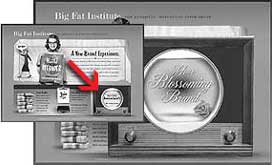 It's by the people at Big Fat Brain. Their web site has been nominated for a Webby and we think it deserves it. After viewing the introduction (45sec), click on the television in the lower right-hand corner promoting "Public Service Announcements." Then sit back and enjoy a thoroughly unique education in brand development. (1min 45sec) It's by the people at Big Fat Brain. Their web site has been nominated for a Webby and we think it deserves it. After viewing the introduction (45sec), click on the television in the lower right-hand corner promoting "Public Service Announcements." Then sit back and enjoy a thoroughly unique education in brand development. (1min 45sec)
Posted by Michael McKinney at 08:38 AM
|
BUILD YOUR KNOWLEDGE
 

How to Do Your Start-Up Right STRAIGHT TALK FOR START-UPS 
Grow Your Leadership Skills NEW AND UPCOMING LEADERSHIP BOOKS 
Leadership Minute BITE-SIZE CONCEPTS YOU CAN CHEW ON 
Classic Leadership Books BOOKS TO READ BEFORE YOU LEAD |
|